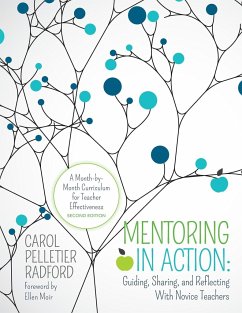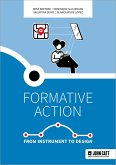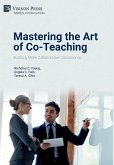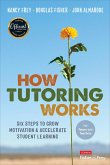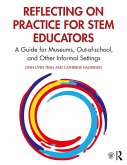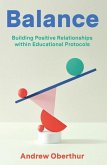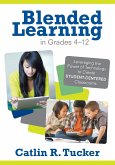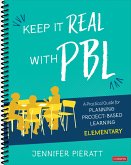Carol Pelletier Radford
Mentoring in Action: Guiding, Sharing, and Reflecting with Novice Teachers
A Month-By-Month Curriculum for Teacher Effectiveness
Carol Pelletier Radford
Mentoring in Action: Guiding, Sharing, and Reflecting with Novice Teachers
A Month-By-Month Curriculum for Teacher Effectiveness
- Broschiertes Buch
- Merkliste
- Auf die Merkliste
- Bewerten Bewerten
- Teilen
- Produkt teilen
- Produkterinnerung
- Produkterinnerung
This is the first book in a two-book set written as a month-to-month curriculum to guide conversations between mentors and new teachers.
Andere Kunden interessierten sich auch für
![Formative action: From instrument to design Formative action: From instrument to design]() Rene KneyberFormative action: From instrument to design12,99 €
Rene KneyberFormative action: From instrument to design12,99 €![Mastering the Art of Co-Teaching Mastering the Art of Co-Teaching]() Nicholas D. YoungMastering the Art of Co-Teaching49,99 €
Nicholas D. YoungMastering the Art of Co-Teaching49,99 €![How Tutoring Works How Tutoring Works]() Nancy Frey (USA San Diego State University)How Tutoring Works41,99 €
Nancy Frey (USA San Diego State University)How Tutoring Works41,99 €![Reflecting on Practice for STEM Educators Reflecting on Practice for STEM Educators]() Lynn Uyen TranReflecting on Practice for STEM Educators46,99 €
Lynn Uyen TranReflecting on Practice for STEM Educators46,99 €![Balance Balance]() Andrew OberthurBalance21,99 €
Andrew OberthurBalance21,99 €![Blended Learning in Grades 4-12 Blended Learning in Grades 4-12]() Catlin R. TuckerBlended Learning in Grades 4-1234,99 €
Catlin R. TuckerBlended Learning in Grades 4-1234,99 €![Keep It Real With PBL, Elementary Keep It Real With PBL, Elementary]() Jennifer R. PierattKeep It Real With PBL, Elementary44,99 €
Jennifer R. PierattKeep It Real With PBL, Elementary44,99 €-
-
-
This is the first book in a two-book set written as a month-to-month curriculum to guide conversations between mentors and new teachers.
Produktdetails
- Produktdetails
- Corwin Teaching Essentials
- Verlag: SAGE Publications Inc
- 2 Revised edition
- Seitenzahl: 312
- Erscheinungstermin: 29. Juli 2016
- Englisch
- Abmessung: 280mm x 216mm x 17mm
- Gewicht: 884g
- ISBN-13: 9781506345116
- ISBN-10: 1506345115
- Artikelnr.: 44604802
- Herstellerkennzeichnung
- Libri GmbH
- Europaallee 1
- 36244 Bad Hersfeld
- gpsr@libri.de
- Corwin Teaching Essentials
- Verlag: SAGE Publications Inc
- 2 Revised edition
- Seitenzahl: 312
- Erscheinungstermin: 29. Juli 2016
- Englisch
- Abmessung: 280mm x 216mm x 17mm
- Gewicht: 884g
- ISBN-13: 9781506345116
- ISBN-10: 1506345115
- Artikelnr.: 44604802
- Herstellerkennzeichnung
- Libri GmbH
- Europaallee 1
- 36244 Bad Hersfeld
- gpsr@libri.de
Carol Pelletier Radford is the founder of Mentoring in Action, an organization dedicated to the success of novice teachers and their mentors. She received her doctorate from the Harvard Graduate School of Education where she focused her studies on mentoring and teacher leadership. Carol is an experienced classroom teacher, university education administrator, and certified yoga instructor. She is the author of bestselling Corwin books Mentoring in Action: Guiding, Sharing, and Reflecting With Novice Teachers ; The First Years Matter: Becoming an Effective Teacher; Teaching With Light: Ten Lessons for Finding Wisdom, Balance, and Inspiration; and "When I Started Teaching, I Wish I Had Known..." Weekly Wisdom for Beginning Teachers. Visit https://mentoringinaction.com/ to learn more about her books and access free podcasts, videos, and courses. You can find her near the beach in Falmouth, Massachusetts and Venice, Florida.
Foreword
Preface
Acknowledgments
About the Author
Introduction: Welcome to Mentoring in Action!
Part I Inducting a Novice Teacher into the Teaching Profession
Induction Programs Must Prepare and Support Mentors
Mentors Are Teacher Leaders
Sustainable Mentoring
What Is Mentoring in Action?
Principles for Effective Mentoring
Qualities and Skills of Effective Mentors
Purposeful Mentoring Conversations
Part II Month-by-Month Mentoring: Supporting Novice Teachers
Why Do We Need a Mentoring Curriculum?
A Month-by-Month Cycle for Mentoring
The Transformation of a Teacher
Orientation to the School and Community: Resources and Values
Beginning the School Year Successfully: Creating a Community of Learners in
the Classroom
Teaching for Understanding: Planning and Delivering Effective Instruction
Assessing Diverse Leaders: How do Teachers Know Students Have Learned?
Maintaining Balance: Teaching and Keeping the Students Interested
Beginning a New Calendar Year: Looking Back and Moving Forward
Engaging Students in the Curriculum: Focus on Content through Active
Inquiry
Collaborating with Novice Teachers: Observing and Building a Trusting
Relationship
Standards: Creating Meaningful Standards-Based Learning Experiences for
Students
Assessing Students¿ Progress: High-Stakes Tests and Teacher Assessment
Completing the Year: Paperwork, Relationships, and Closing a Room
Final Reflection and Planning For Next Year: Retreat, Reflect, Renew
Preface
Acknowledgments
About the Author
Introduction: Welcome to Mentoring in Action!
Part I Inducting a Novice Teacher into the Teaching Profession
Induction Programs Must Prepare and Support Mentors
Mentors Are Teacher Leaders
Sustainable Mentoring
What Is Mentoring in Action?
Principles for Effective Mentoring
Qualities and Skills of Effective Mentors
Purposeful Mentoring Conversations
Part II Month-by-Month Mentoring: Supporting Novice Teachers
Why Do We Need a Mentoring Curriculum?
A Month-by-Month Cycle for Mentoring
The Transformation of a Teacher
Orientation to the School and Community: Resources and Values
Beginning the School Year Successfully: Creating a Community of Learners in
the Classroom
Teaching for Understanding: Planning and Delivering Effective Instruction
Assessing Diverse Leaders: How do Teachers Know Students Have Learned?
Maintaining Balance: Teaching and Keeping the Students Interested
Beginning a New Calendar Year: Looking Back and Moving Forward
Engaging Students in the Curriculum: Focus on Content through Active
Inquiry
Collaborating with Novice Teachers: Observing and Building a Trusting
Relationship
Standards: Creating Meaningful Standards-Based Learning Experiences for
Students
Assessing Students¿ Progress: High-Stakes Tests and Teacher Assessment
Completing the Year: Paperwork, Relationships, and Closing a Room
Final Reflection and Planning For Next Year: Retreat, Reflect, Renew
Foreword
Preface
Acknowledgments
About the Author
Introduction: Welcome to Mentoring in Action!
Part I Inducting a Novice Teacher into the Teaching Profession
Induction Programs Must Prepare and Support Mentors
Mentors Are Teacher Leaders
Sustainable Mentoring
What Is Mentoring in Action?
Principles for Effective Mentoring
Qualities and Skills of Effective Mentors
Purposeful Mentoring Conversations
Part II Month-by-Month Mentoring: Supporting Novice Teachers
Why Do We Need a Mentoring Curriculum?
A Month-by-Month Cycle for Mentoring
The Transformation of a Teacher
Orientation to the School and Community: Resources and Values
Beginning the School Year Successfully: Creating a Community of Learners in
the Classroom
Teaching for Understanding: Planning and Delivering Effective Instruction
Assessing Diverse Leaders: How do Teachers Know Students Have Learned?
Maintaining Balance: Teaching and Keeping the Students Interested
Beginning a New Calendar Year: Looking Back and Moving Forward
Engaging Students in the Curriculum: Focus on Content through Active
Inquiry
Collaborating with Novice Teachers: Observing and Building a Trusting
Relationship
Standards: Creating Meaningful Standards-Based Learning Experiences for
Students
Assessing Students¿ Progress: High-Stakes Tests and Teacher Assessment
Completing the Year: Paperwork, Relationships, and Closing a Room
Final Reflection and Planning For Next Year: Retreat, Reflect, Renew
Preface
Acknowledgments
About the Author
Introduction: Welcome to Mentoring in Action!
Part I Inducting a Novice Teacher into the Teaching Profession
Induction Programs Must Prepare and Support Mentors
Mentors Are Teacher Leaders
Sustainable Mentoring
What Is Mentoring in Action?
Principles for Effective Mentoring
Qualities and Skills of Effective Mentors
Purposeful Mentoring Conversations
Part II Month-by-Month Mentoring: Supporting Novice Teachers
Why Do We Need a Mentoring Curriculum?
A Month-by-Month Cycle for Mentoring
The Transformation of a Teacher
Orientation to the School and Community: Resources and Values
Beginning the School Year Successfully: Creating a Community of Learners in
the Classroom
Teaching for Understanding: Planning and Delivering Effective Instruction
Assessing Diverse Leaders: How do Teachers Know Students Have Learned?
Maintaining Balance: Teaching and Keeping the Students Interested
Beginning a New Calendar Year: Looking Back and Moving Forward
Engaging Students in the Curriculum: Focus on Content through Active
Inquiry
Collaborating with Novice Teachers: Observing and Building a Trusting
Relationship
Standards: Creating Meaningful Standards-Based Learning Experiences for
Students
Assessing Students¿ Progress: High-Stakes Tests and Teacher Assessment
Completing the Year: Paperwork, Relationships, and Closing a Room
Final Reflection and Planning For Next Year: Retreat, Reflect, Renew

